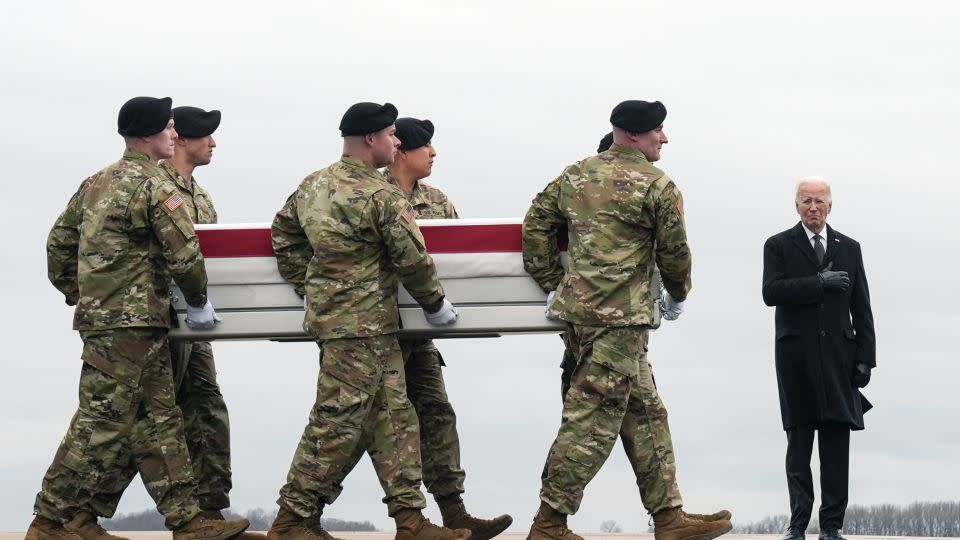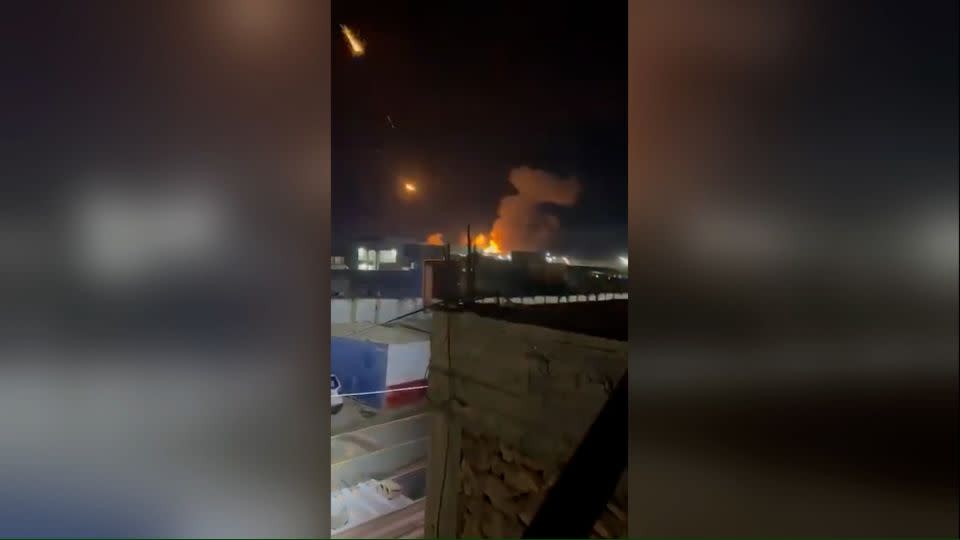What we know about the US strikes in Iraq and Syria
The United States on Friday conducted major airstrikes on dozens of targets across Iraq and Syria in retaliation for a drone attack in Jordan last month that killed three US troops.
The strikes were larger in number and scale than previous ones launched since October, when Iran-backed armed groups began attacking US forces across the region in protest of Israel’s war in Gaza.
With the US warning of more strikes to follow, here’s what we know.
What triggered the strikes?
The US strikes were in response to a drone attack by Iran-backed militants on a US military outpost in Jordan on January 28, which killed three US service members and wounded more than 40 others.
The attack marked the worst loss of US military life in the region in nearly three years and the first US military fatalities since the war in Gaza erupted.
US President Joe Biden at the time vowed to hold “all those responsible to account at a time and in a manner our choosing.”
The attack in Jordan marked a significant escalation in tensions between the US and Iran-backed groups attacking American bases across the region in protest at Israel’s war in Gaza. Believed to be funded and trained by Iran, these groups view the US as responsible for Israel’s actions by supplying weapons to the Jewish state and failing to force a ceasefire.
Immediately after US officials in Washington received word that Tower 22 in Jordan was struck, Biden was presented with, and approved, a range of options on Sunday for retaliation, multiple sources told CNN.
Biden specifically gave the green light for the first set of strikes in Iraq and Syria that was executed Friday in a Situation Room meeting with his top national security advisers on Monday.
It was in that same meeting that the president was informed with the assessment that Islamic Revolutionary Guard Corps-backed militant groups were to blame for the Sunday drone attack, according to the sources.
Since October, when the Israel-Hamas war began, the US military has carried out several strikes targeting Iranian proxies’ weapons depots in Iraq and Syria, but none of those strikes deterred the militants, whose 165 attacks injured more than 120 US service members across the region.
None of the proxy groups’ other attacks since October, however, have resulted in the deaths of US service members – compelling Biden and his national security team to respond more forcefully.

What and where did the US hit?
The US said the attack lasted 30 minutes, hitting 85 targets across seven locations in Iraq and Syria.
The White House said aircraft including B-1 bombers were used in the operation. More than 125 precision-guided munitions were fired, the White House said, adding that the strikes were “successful.”
The US strikes killed at least 16 people in Iraq, including civilians, and injured 25 others, the Iraqi government said Friday. The attacks hit areas close to the border with Syria, and targeted facilities used by Iranian-linked al Hashd al Shabi – or Popular Mobilization Units (PMU) – in the Iraqi city of Al-Qaim, Iraqi officials said.
The PMU is a predominantly Shiite Iran-backed paramilitary force based in Iraq. Unlike other Iran-backed groups around the region, the PMU is tied to the Iraqi government and is closely linked to Iran-aligned Shiite blocs that for years dominated politics in Iraq.
In 2016, the Iraqi parliament passed a bill recognizing the PMU as a government entity operating alongside the Iraqi military. The organization is an umbrella group, with several forces operating underneath its wing – including Iraq’s powerful Kataib Hezbollah.
The mayor of Al-Qaim, Turki Al-Mahalawi, said the strikes hit three houses used as weapon warehouses by the Iran-backed PMU. The US had struck targets there last month.
While US National Security Council spokesman John Kirby said Washington had informed the Iraqi government of its plans before carrying out the strikes, the Iraqi government denied that claim, saying the US is “misleading international public opinion.”
Syria’s state-run news agency SANA said the airstrikes hit the eastern areas of Deir Ezzor, Al-Bukamal, Al-Mayadeen and their surroundings on the Syrian-Iraqi border.
Kirby said the US did not know now how many militants were killed or wounded, but the Syrian military on Saturday said the strikes had killed civilians and soldiers and caused “significant damage” to infrastructure.
CNN cannot independently verify the number or nature of the casualties.
The US did not strike Iranian territory. A senior administration official confirmed to CNN that the US will not do so, and will focus only on targets outside of the country.
Director of the Joint Chiefs of Staff, Lt. Gen. Douglas Sims, said the locations of the strikes were chosen “with an idea that there would likely be casualties” among the Iran’s Revolutionary Guard Corps (IRGC) and militia personnel who use them.

What has the reaction been?
Iraq and Syria condemned the US attack as infringements on their sovereignty that risk fueling regional conflict.
The Syrian foreign ministry said it “condemns this blatant American violation,” adding that it “categorically rejects all the pretexts and lies promoted by the American administration to justify this attack.” Syria also warned that the US attack could “fuel the conflict in the Middle East in a very dangerous way.”
A spokesperson for Iraq’s Armed Forces, meanwhile, decried the attacks as a “violation of Iraqi sovereignty.”
Echoing both, Iran warned the strikes would only escalate tensions.
“Iran considers the attacks as a violation of the sovereignty and territorial integrity of Iraq and Syria, international law and a clear violation of the United Nations Charter,” Iran’s foreign ministry said in a statement Friday. The attack is “an adventurous action and another strategic mistake by the US government, which will have no result other than intensifying tension and instability in the region,” the statement added.
Some US lawmakers were happy with the attack, while others thought it came too late and wasn’t surprising enough for the intended targets.
Speaker of the US House of Representatives Mike Johnson, a Republican, criticized the military response, writing in part, “The administration waited for a week and telegraphed to the world, including to Iran, the nature of our response.
“The public handwringing and excessive signaling undercuts our ability to put a decisive end to the barrage of attacks endured over the past few months,” Johnson said.
Senate Armed Services Chairman Jack Reed, a Democrat, praised the strikes, saying in a statement that “this was a strong, proportional response.”
What happens next?
The US strikes are likely to continue. But neither the US nor Iran wants a wider war.
US Defense Secretary Lloyd Austin said the US strikes in Iraq and Syria on Friday are “the start of our response,” adding that Biden has “directed additional actions to hold the IRGC and affiliated militias accountable for their attacks on US and Coalition Forces.”
Both Austin and Biden have however repeated that the US does not seek a wider regional war.
“The United States does not seek conflict in the Middle East or anywhere else in the world,” Biden said in a statement Friday, following the strikes on Iraq and Syria. “But let all those who might seek to do us harm know this: If you harm an American, we will respond.”
Friday’s US strikes were more significant than previous attacks on Iranian-backed militias over the last several weeks, which have primarily focused on weapons storage or training facilities.
The airstrikes were “far bigger than any action undertaken before against Iran’s proxies,” wrote Charles Lister, director of the Syria and Countering Terrorism and Extremism programs at the Middle East Institute in Washington, DC, on X. He added that “huge secondary explosions on both sides of the border suggest big rocket/missile depots have been hit.”
But the Biden administration is threading a needle – it wants to deter and stop further attacks but avoid a full-scale conflict with Iran in a region already roiled by the continuing Israel-Hamas war in Gaza.
For now, it doesn’t seem like the US struck “high value targets, focusing instead on command/control, logistics and drone/rocket stock,” Lister wrote on X.
Tehran has repeatedly said it does not seek conflict. On Friday, Iranian President Ebrahim Raisi said his country will not initiate a war but will “respond strongly” to bullies.
There have been mixed messages from Iran-backed militias across the region. While the Iran-backed Kataib Hezbollah group in Iraq announced Tuesday it is suspending attacks on US forces, another group in Iraq, Al-Nujaba, said it would continue attacking American forces.
Adding to a volatile situation, experts say that Iran does not exercise full control over its proxies.
This story has been updated with additional information.
CNN’s MJ Lee, Mohammed Tawfeeq, Mitchell McCluskey, Aileen Graef, Kareem El Damanhoury, Manu Raju and Adam Pourahmadi contributed reporting.
For more CNN news and newsletters create an account at CNN.com
